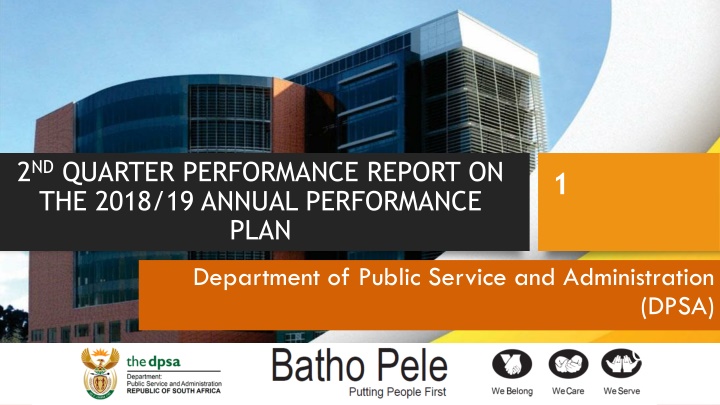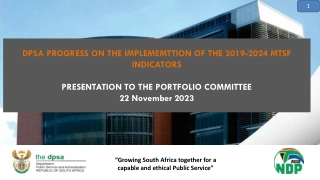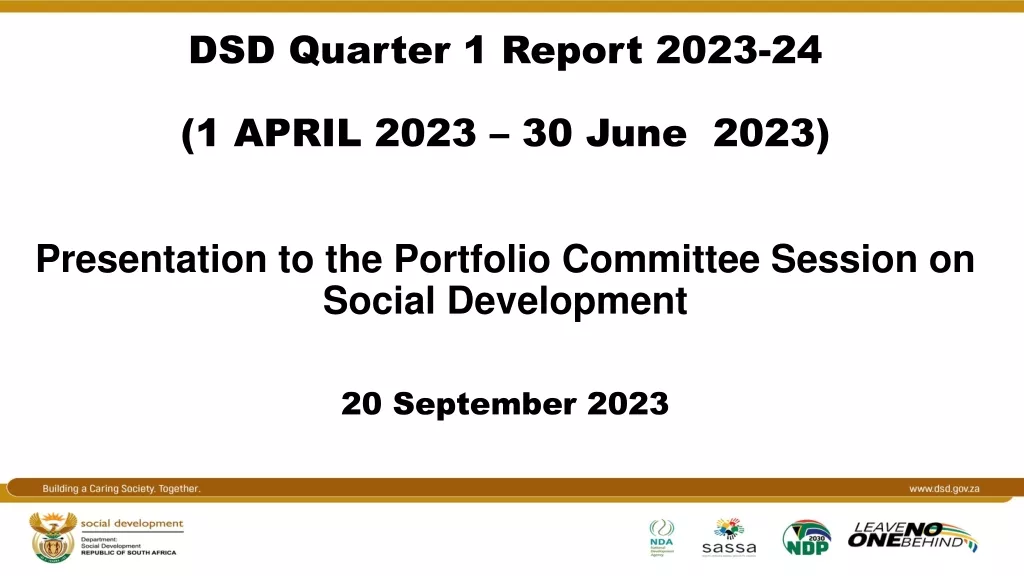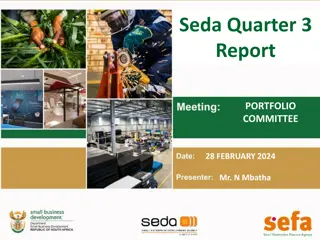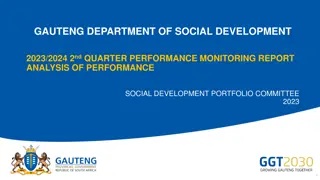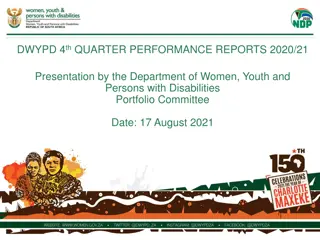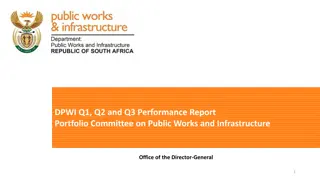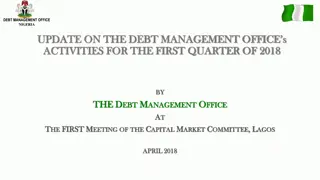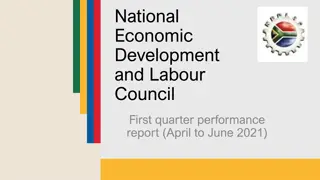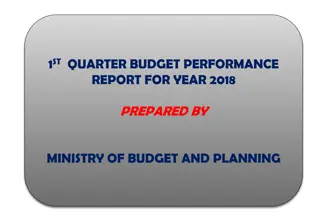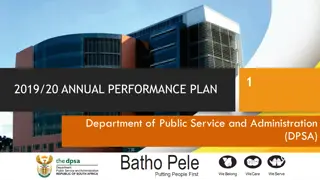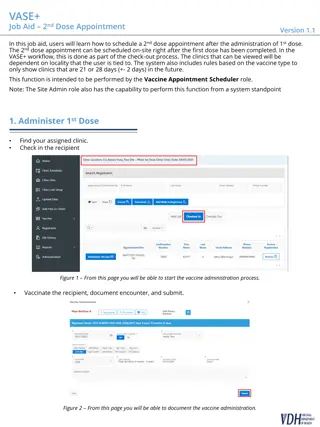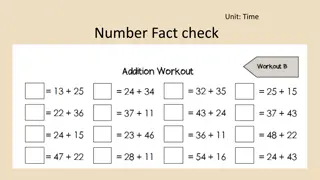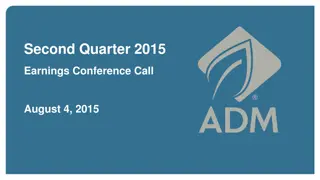DPSA 2nd Quarter Performance Report 2018/19
This presentation outlines the Department of Public Service and Administration's (DPSA) performance in the 2nd quarter of the 2018/19 Annual Performance Plan. It includes information on human resource, financial progress, audit outcomes, and recommendations. The overall achievement rate was 79%, with the Administration programme reaching 100% of its targets. The report provides insights into the implementation progress and budget utilization across various programmes.
Download Presentation

Please find below an Image/Link to download the presentation.
The content on the website is provided AS IS for your information and personal use only. It may not be sold, licensed, or shared on other websites without obtaining consent from the author.If you encounter any issues during the download, it is possible that the publisher has removed the file from their server.
You are allowed to download the files provided on this website for personal or commercial use, subject to the condition that they are used lawfully. All files are the property of their respective owners.
The content on the website is provided AS IS for your information and personal use only. It may not be sold, licensed, or shared on other websites without obtaining consent from the author.
E N D
Presentation Transcript
2NDQUARTER PERFORMANCE REPORT ON THE 2018/19 ANNUAL PERFORMANCE PLAN 1 Department of Public Service and Administration (DPSA) Oct 2018
PRESENTATION OUTLINE 2 Introduction DPSA 2nd Quarter Performance on the implementation of the 2018/19 APP Human Resource Information Financial Information Progress on 2017/18 Audit Outcomes Progress on 2017/18 BRRR Recommendations
INTRODUCTION 3 This is a presentation on the implementation of the 2nd quarter targets (July September 2018) on the Department of Public Service and Administration s (DPSA s) 2018/19 Annual Performance Plan (APP). The 2ndquarter performance report was audited by the Department s Internal Audit and Risk Management Directorate. The Department has complied with the submission of the report to the Minister, National Treasury, and the Department of Planning, Monitoring and Evaluation (DPME) by 31 October 2018. The progress on the implementation of the APP targets is rated as Achieved or Not Achieved.
OVERALL DPSA 2ND QUARTER PERFORMANCE ON THE IMPLEMENTATION OF THE 2018/19 APP TARGETS 4 7 (21%) 26 (79%) Achieved Not Achieved
QUARTERLY PERFORMANCE TRENDS 5 Quarterly Performance Trends 90% 80% 70% 26 25 60% (79%) (86%) 50% 40% 30% 20% 4 7 (14%) (21%) 10% 0% 1st Quarter 2nd Quarter Achieved Not Achieved
SUMMARY OF CONSOLIDATED QUARTER PERFORMANCE PER PROGRAMME Branch Number of Quarter Targets Targets Achieved 6 % Spent on Budget as at 30 September 2018 Number of Number of Non-Achieved Targets Percentage Achievement 6 5 1 83% 37.8% 1. Administration 7 7 0 100% 44.6% 2. Policy Development, Research and Analysis 4 3 1 75% 39.7% 3. Public Service Employment and Conditions of Services 6 6 0 100% 35.7% 4. Government Chief Information Officer 7 5 2 71% 37.7% 5. Service Delivery Support 3 0 3 0% 41.1% 6. Governance of Public Administration 33 26 7 79% 38.8% OVERALL DPSA PERFORMANCE
PROGRAMME 1: ADMIN (1) TARGETS ACHIEVED 7 The Programme had 6 Quarter Targets. 5 (83%) targets were achieved and 1 (17%) target was not achieved. The Department complied with regards to the submission of the following; The first quarter 2018/19 Interim Financial Statement was submitted to National Treasury in July 2018. As at 30 June 2018, the Department s budget allocation for the 2018/19 financial year was R956 656 million, of which R88 065 million (18%) was spent. The 1st quarter report on the implementation of the 2018/19 APP was submitted to the Executive Authority, National Treasury and DPME in July 2018. During the 1st quarter, the Department had a total of 29 targets, of which 25 (86%) were achieved and 4 (14%) were not achieved. The 1st quarterly 2018/19 Internal Audit and 2nd Risk Management performance reports were submitted to the Audit and Risk Committee in August 2018. Based on the audits finalised during the reporting period, the Department s systems of internal control for the 1st quarter performance information and interim financial statements are adequate and effective.
PROGRAMME 1: ADMIN (2) TARGETS ACHIEVED 8 The 1stquarter 2018/19 report on the DPSA s compliance to Financial Management, Human Resources and Labour Relations Prescripts was submitted to the Director-General in July 2018. There were 23 compliance areas, of which 20 (87%) were complied with. The areas that were not complied with relate to the submission of the Human Resource Plan, Workplace Skills Plan and the Annual Training Report and the Department of Public Works Directive on leased accommodation. The 1st quarterly 2018/19 progress report on the implementation of the Department s Bi- lateral and Multi-lateral programmes was submitted to the Director-General in September 2018. During the reporting period, the Department participated in events such as the Organisation for Economic Cooperation and Development (OECD) Policy Making Workshop and the 28th Forum of Heads of State and Government participating in the Africa Peer Review Mechanism (APRM).
PROGRAMME 1: ADMIN (3) NON-ACHIEVED TARGETS 9 The report on the compliance with the Broad Based Black Economic Empowerment (BBBEE) status level of contributor as prescribed in the preferential procurement regulations 2017 was submitted to the Chief Financial Officer in October 2018. The consolidation of the data required for the compilation of the report took longer than anticipated as this was for the first time that the Department compiled such a report. The Preferential Procurement Regulation stipulates that the 80/20 preference point system must be applied for the acquisition of goods or services equal to or above R30 000 and up to R50 million inclusive of all applicable taxes. The 90/10 preference point system must be applied to the acquisition of goods or services above R50 million. The Department did not procure any goods or services above R50 million and therefore the 80/20 preference point system was applied where applicable.
PROGRAMME 2: PDR&A (1) TARGETS ACHIEVED 10 The Programme achieved all of its 7 (100%) Quarter Targets. Further consultations on the refined draft Strategic Framework for the Public Administration Norms and Standards were held with departments that fall within the Governance and Administration Cluster in July 2018. The Strategic Framework will inform the structure, governance and functioning of the Office of Standards in terms of the Public Administration Management Act, 2014. A draft business case, which will inform the establishment of the Office of Standards was developed in September 2018. A national advocacy workshop to validate Public Service performance information to be included in data collection and measurement tools (proposed amendments to the Annual Report performance information) was held with national and provincial government departments in September 2018. The inputs from the workshop will be used for producing the compliance report on the monitoring of selected Public Service Norms and Standards by line departments.
PROGRAMME 2: PDR&A (2) TARGETS ACHIEVED 11 The 1st report on the consultations undertaken with the Centre of Government departments on the proposed configuration of the centre of national government was compiled in September 2018. The consultations focused on the fragmentation of mandates at the Centre of Government as well as the re-sizing of departments. Consultations were held with the DPSA Government Technical Working Group to inform the 1st draft White Paper on the Transformation and Modernisation of Public Administration in August 2018. The White Paper aims to propose further reforms in the area of public administration. Four (4) workshops were conducted which compromised of the following departments, to support them with the application of the approved Public Service Productivity Measurement Tool: Department of Social Development Departments of Higher Education, Energy, Correctional Services and National Treasury North West Department of Public Works and Roads North West Department of Education and Sports Development. The Productivity Measurement Tool serves to strengthen the service delivery value chain by identifying possible blockages in service delivery operations and identifying areas of improvement.
PROGRAMME 2: PDR&A (3) TARGETS ACHIEVED 12 A workshop on the draft Organisational Functionality Assessment Tool were held with national departments in September 2018. The Tool serves to assist departments in assessing and diagnosing whether all the necessary service delivery enablers are in place to support delivery processes in an optimum and accountable manner.
PROGRAMME 3: LR&HRM (1) TARGETS ACHIEVED 13 The Programme had 4 Quarter Targets. 3 (75%) targets were achieved and 1 (25%) target was not achieved. The report on the average percentage of funded vacant posts on PERSAL, against the targeted 10% or less, was submitted to the Director-General in September 2018. As at 30 June 2018, the average vacancy rate in the Public Service was 9.61% as compared to 10.27% during the 2017/18 financial year. During the 1st quarter, the medium period for filling of vacant posts in the Public Service was 5 months as compared to 8 months during the 2017/18 financial year. The validation of data on the appointment of persons into developmental programmes within the Public Service was conducted in September 2018. During the 2016/17 - 2017/18 financial years, 68 072 individuals were recruited into developmental programmes. The trend over these financial years indicate that most of the beneficiaries participated in internship programmes as graduate interns and student interns, then followed by learnership programmes, apprenticeship programmes and other programmes.
PROGRAMME 3: LR&HRM (2) TARGETS ACHIEVED 14 The 1st quarter report for the 2018/19 financial year on the number of days taken to resolve disciplinary cases was submitted to the Director-General in September 2018. As at 30 June 2018, the Department received 405 cases of misconduct from national departments and 1 717 cases from provincial departments. The status of misconduct cases is indicated in the graph. Status of misconduct cases June 2018 1 015 (59%) Provincial Departments 702 (41%) During the 1st quarter, the total cost of precautionary suspensions for national departments was R4 838 938.50, with 59 employees placed on precautionary suspension. The total cost for provincial departments was R30 770 580.78, with 166 employees placed on precautionary suspension. 258 (64%) National Departments 147 (36%) 0 10 20 30 40 50 60 70 Number of cases pending Number of cases finalised
PROGRAMME 3: LR&HRM (3) NON-ACHIEVED TARGET 15 Due to limited human capacity, the 2nd quarter report on the implementation of the Government Employees Housing Scheme (GEHS) could not be timeously finalised and was subsequently submitted to the Director-General in October 2018. The report indicates that as at 1 August 2018, 575 032 employees had enrolled to receive the GEHS housing allowance for home ownership and 346 276 employees who do not own houses have a portion of the housing allowance diverted and accumulated into a savings facility. To date, nearly R5.9 billion has been accumulated by employees in the Individual Linked Savings Facility.
PROGRAMME 4: GCIO (1) TARGETS ACHIEVED 16 The Programme achieved all of its 6 (100%) Quarter Targets. A consultation was held on the 1st draft Public Service Digitalization Strategic Framework with the Government Information Technology Officers (GITOs), external experts as well as national and provincial departments in August 2018. The purpose of the Digitalization Strategic Framework is to define key considerations by government to transition towards a Digital Government. A consultation on the 1st draft Public Service Cloud Policy was held with the GITOs, State Information Technology Agency and external expects in August 2018. The Cloud Policy will guide departments on what to consider prior to procuring cloud services. A draft report with preliminary findings on Information and Communication Technology (ICT) expenditures by departments was compiled in August 2018 for consultation with selected national and provincial departments. The report indicates that above R36 billion was spent on ICT during 2017/18 financial year as compared to above R35 billion spent during the 2016/17 financial year. The preliminary findings are that the increase in ICT expenditure can be attributed to, amongst others, upgrades of equipment and systems as well as the security software installations done by departments.
PROGRAMME 4: GCIO (2) TARGETS ACHIEVED 17 A consultation on the draft Public Service ICT Value Management Framework was held with the Standing Committee on Procurement and GITOs in August 2018. The purpose of the ICT Value Management Framework is to guide departments on how to measure the value from the ICT investments. The Government ICT Security Community was consulted on the draft Public Service ICT Security Assessment Standard in July 2018. The purpose of the Assessment Standard is to articulate the recommendations of the ICT security guidelines into measurable criteria into which Heads of Department can measure the ICT security. The Government corporate governance specialists (Task Team) was consulted on the Corporate Governance of ICT Assessment Standard in August 2018. The purpose of the Assessment Standard is to articulate the recommendations of the Corporate Governance of ICT Policy Framework into measurable criteria against which the Heads of Department can measure their respective departments ICT conformance and performance.
PROGRAMME 5: SDS (1) TARGETS ACHIEVED 18 The Programme had 7 Quarter Targets. 5 (71%) targets were achieved and 2 (29%) targets were not achieved. Status of submission rate of SDIPs Support was provided through engagements to over 10 departments such as the Limpopo Office of the Premier and the South African Police Service, on the implementation of the 3 building blocks of the Operations Management Framework between August and September 2018. The Operations Management Framework aims to assist government institutions to plan, structure, execute and continuously improve their operations for the effective and efficient delivery of services. 83% 23% Data collection on the quality of the Service Delivery Improvement Plans (SDIPs) for the 2018 2021 cycle and the implementation of the SDIPs for the 2015 2018 cycle commenced in August 2018. As at September 2018, 106 out of 161 (66%) national and provincial departments submitted their SDIPs for the 2018 2021 cycle, which was due by 31 March 2018. Letters were issued to non-complying departments. Out of the 106 SDIPs submitted, 46 were assessed. The breakdown of the submission of SDIPs is indicated in the graph. 0% 20% 40% 60% 80% 100% Provincial departments National departments
PROGRAMME 5: SDS (2) TARGETS ACHIEVED 19 Data on the implementation of the Batho Pele standards by national and provincial departments was collected in July and August 2018. The purpose of Batho Pele standards is to measure improvements on the implementation of Batho Pele Programme. A report on the assessment of national and provincial departments implementing the Batho Pele standards will be produced. Data on the implementation of the Public Service Charter was collected in August 2018. The Public Service Charter enables service beneficiaries to understand what they can expect from the State. This work will culminate in the production of a report on the implementation of the Public Service Charter by departments. More than two stakeholder consultations on the Community Development Workers Framework (CDWF) concept was held with various municipalities in Limpopo in September 2018. The additional consultations were held due to the demand for participation by stakeholders.
PROGRAMME 5: SDS (3) NON-ACHIEVED TARGETS 20 As part of the development of the framework for the establishment, promotion and maintenance of service centres, a situational analysis on the Thusong Service Centre Programme was conducted in August 2018. The framework will only be developed in March 2019 following the completion of the assessments on service delivery points, which is currently being conducted. No consultations to orientate stakeholders on the African Peer Review Mechanism (APRM) 2nd Generation Review process were held as the review will only be conducted following the 2019 general elections. The consultation process will therefore only commence during the 2019/20 financial year.
PROGRAMME 6: GPA (1) NON-ACHIEVED TARGETS 21 The Programme had 3 Quarter Targets and all the targets were not achieved. Written communication to departments that did not comply with the Directive on Public Administration and Management Delegations was not issued as there was a delay in compiling the database of non-complying departments. The letters to be issued to non-complying departments were submitted for the Minister s approval, after which they will be issued. Support through engagements on the implementation of the Guideline on mentoring and peer support mechanisms was conducted with the Department of Correctional Service and the DPSA in September 2018. The other invited departments could not attend due to other service delivery commitments. A workshop to provide support to other national departments is scheduled for November 2018. The consultative workshops on the Framework for the Management of Protected Disclosures (whistle blowing) by Public Service employees could not be conducted as the Guide on reporting unethical conduct, corruption and non- compliance to the Public Service Act, 1994 and Public Service Regulations, 2016 was approved by the MPSA in September 2018. The consultative workshops will be held in October 2018.
HUMAN RESOURCE INFORMATION SEPT 2018 22 Vacancy Rate Vacancy Rate The DPSA had 494 posts,of which 70 are vacant = 14.17% vacancy rate. The chart provides a breakdown of the vacancy rate. 70 (14%) Out of the 22 vacant posts that are prioritised to be filled, 8 are for SMS members whilst 14 are for employees at levels 2 12. 424 (86%) Certain vacant posts have been identified to be abolished, which is due to the limited compensation budget. This will assist to reduce the current vacancy rate Filled posts Vacant posts Females at Management Level SMS (Levels 13 16) 40.21% MMS (Levels 11 12) 58.62% People with Disabilities 2.59% To improve the percentage of women at SMS, the Department is targeting to fill its SMS vacant posts with females
TOTAL EXPENDITURE PER PROGRAMME SEPT 2018 23 Description Allocated Budget Actual Expenditure - 30 September 2018 Available Budget % Spent on Budget R'000 R'000 R'000 149 508 % Administration 240 559 91 051 37.8% Policy Development, Research and Analysis Public Service Employment and Conditions of Service Government Chief Information Officer 3 108 15 203 18 905 44.6% 78 028 22 441 30 991 8 022 47 037 14 419 39.7% 35.7% Service Delivery Support Governance of Public Administration Total 57 392 48 740 481 268 21 641 20 038 186 946 35 751 28 702 294 322 37.7% 41.1% 38.8% Centre for Public Service Innovation 36 030 17 948 18 082 49.8% National School of Government 168 959 84 066 84 893 49.8% Public Service Commission 264 399 133 734 130 665 50.6% Total Total 469 388 235 748 233 640 50.2% 950 656 422 694 527 962 44.5%
TOTAL EXPENDITURE PER ECONOMIC CLASSIFICATION SEPT 2018 24 Description Allocated Budget Actual Expenditure - 30 September 2018 Available Budget % Spent on Budget R'000 R'000 R'000 % Compensation of Employees 283 140 134 057 149 083 47.3% Goods and Services 187 020 45 397 141 623 24.3% Payment for Financial Assets 0 175 -175 Transfers and Subsidies 472 881 236 963 235 918 50.1% Payment of Capital Assets Total 7 615 6 102 1 513 80.1% 950 656 422 694 527 962 44.5%
OTHER FINANCIAL INFORMATION 25 30 Days - No payment exceeded the 30 days period during the 2nd quarter of the 2018/19 financial year. Unauthorised expenditure - No unauthorised expenditure was incurred during the 2nd quarter. Fruitless and wasteful expenditure No fruitless and wasteful expenditure was incurred during the 2nd quarter. Irregular expenditure 11 cases of irregular expenditure amounting to R236 594.02 relating to the 2018/19 financial year were identified and reported to the Accounting Officer. The Department will commence with a process of investigating these cases.
PROGRESS ON 2017/18 AUDIT OUTCOMES 26 The Department received an unqualified opinion with findings from the Auditor-General. The action plan to address the following audit findings is monitored and reported on to the Executive Committee and the Audit Committee. AUDIT FINDING PROGRESS 1. Reasons as per the deviations for requesting quotations for a shorter period were not captured A Supply Chain Management (SCM) Circular regarding procurement planning was issued to the Department to prevent deviations from the SCM Policy 2. Three quotations were not always obtained as required by the Practice Note 8 of 2007/08 due to misalignment to the Catering Policy The Catering Policy is currently under review to ensure that it is aligned to National Treasury s Practice Note 8 of 2007/08 3. Approval for other remunerative work by employees not obtained The official has submitted proof that he has deregistered from the company. The Department is however in the process of investigating the matter
PROGRESS ON 2017/18 BRRR RECOMMENDATIONS 27 1. The DPSA should engage the National Treasury and the Department of Planning, Monitoring and Evaluation (DPME) on the budget shortfall impacting on the effectiveness, efficiency and independence of the Public Service Commission (PSC), besides the reporting by the Commission to the Presidency. This is because the MPSA is responsible for the sector and the Minister of Planning, Monitoring and Evaluation, respectively, is responsible for planning and prioritisation of budget and programmes of government. The PSC is an independent body that reports to Parliament and the responsibility for addressing budget shortfalls is therefore that of the PSC and the Office of the PSC. 2. The DPSA and its entities have to respond to the Committee on a bi-annual basis about the progress made the implementation of the BRRR, especially during the second quarter and fourth quarter reporting so that they can easily track progress on the recommendation by the Committee. concerning The progress on the implementation of the BRRR will be reported on as part of the second quarter and fourth quarter presentations on the implementation of the Department s 2018/19 Annual Performance Plan to the Portfolio Committee.
PROGRESS ON 2017/18 BRRR RECOMMENDATIONS 28 3. The DPSA and its entities should develop an action plan to address matters identified by the Auditor-General audit outcomes and report to the Committee on the improvement plan. An action plan to address matters identified by the Auditor-General audit outcomes has been developed and will be reported as part of the second quarter and fourth quarter presentations on the implementation of the Department s 2018/19 Annual Performance Plan to the Portfolio Committee. 3.1 There are still concerns regarding irregular expenditure, obtaining a required number of quotes and internal controls. The Department reports on the status of its irregular expenditure to the Portfolio Committee when presenting on its quarterly performance.
PROGRESS ON 2017/18 BRRR RECOMMENDATIONS 29 4. The DPSA should issue a circular to encourage departments to submit reports timeously on the disciplinary cases in the Public Service. A Ministerial Directive on the capturing of labour relations related cases on the Personnel and Salary Administration System (PERSAL) was issued in July 2017 to national and provincial departments to direct them to capture information on PERSAL. 4.1 Having trained legal experts emanating from government departments on numerous skills to fairly manage disciplinary cases, the departments must speed up the finalisation of cases and ensure adherence to the prescribed timeframe of 90 days. There is also an improvement in capturing of cases on PERSAL and also in the timeframe of finalising disciplinary cases from an average of 142 days during the 2015/16 financial year to 96 days during the 2017/18 financial year as well as to date.
PROGRESS ON 2017/18 BRRR RECOMMENDATIONS 30 5. The DPSA working with the National Treasury and the Department of Trade and Industry should ensure that PERSAL, Central Database System and CIPRO system are synchronised in order to prohibit government officials from doing business with the state as a measure used to promote professional ethics within the Public Service. The Central Supplier Database (CSD) for Government already integrates data from PERSAL, as provided by the Department; the Companies and Intellectual Property Commission (CIPC); and Municipalities and Metros to flag suppliers where government officials are owners/directors. National Treasury is currently in the process of negotiating with State Owned Entities to obtain employee data from them. All national and provincial departments, municipalities and metros, as well as State Owned Entities, have access to the Central Supplier Database for verification of the status of owners/directors of registered suppliers.
PROGRESS ON 2017/18 BRRR RECOMMENDATIONS 31 6. The DPSA should continuously communicate by issuing circulars annually to the departments to conscientise government officials about prohibition of public servants from doing business with any organ of state. The focus should be mainly in the provinces as a number of officials doing business with any organs of state increased from 373 in 2016/17 to 496 in 2017/18 financial year concerning provincial officials. The DPSA has issued the Directive on Other Remunerative Work Outside an Employee s Employment in the Relevant Department as Contemplated in Section 30 of the Public Service Act, 1994 (1 Nov 2016) and a Directive on Conducting Business with an Organ of State (Jan 2017). 6.1 Officials should be given a new timeline either to resign as Directors of companies or in the Public Service; and failure to resign should constitute a fine or imprisonment as the Act provides. The 2016 Public Service Regulations gave a transitional period from August 2016 to January 2017 for employees in the Public Service to resign from businesses that are conducting business with an organ of state. As a result, the Department cannot give another timeline for public servants to resign, as it would be in contravention with the Public Service Regulations. The Public Administration Management Act, 2014 provides for criminalization but this will only be in effect once regulations are promulgated. Currently, departments are required to discipline non-compliant officials. The DPSA has written to departments to identify the officials possibly doing business with the state and to report on action taken.
PROGRESS ON 2017/18 BRRR RECOMMENDATIONS 32 The DPSA should intensify its efforts to attract more young people into the Public Service by utilising the Public Service Graduate Recruitment Scheme. 7. The Minister launched the Graduate Recruitment Scheme in July 2018 for the Public Service and administration. It is envisaged that a first cohort of graduates will be appointed into the Scheme from 1 March 2018. A revised Directive on the appointment of persons into Developmental Programmes (internship, learnership, apprenticeship, graduate development programmes, structured youth development and related programmes) was issued in May 2018 and expanded the scope of developmental programmes to align it with other policies and strategies of government such as the Youth Employment Accord (2013), the Decade of Artisan Development (2013), the Youth Employment Service (YES) Initiative (2017) and the Chapter 13 of the National Development Plan. 7.1 Furthermore, the DPSA should continue to support and monitor the appointment of youth into learnership, internship and artisan programmes and to appoint them permanently and on a contract basis. The DPSA continues to support departments and to monitor and report on the appointments of youth. As of March 2018, 21 171 youth were appointed into developmental programmes in national and provincial departments during the 2017/18 financial year. The annual report for the 2018/19 financial year will be complied in March 2019.
PROGRESS ON 2017/18 BRRR RECOMMENDATIONS 33 The DPSA working in collaboration with the National Treasury should finalise policy and strategy on voluntary severance packages for officials approaching retirement age by relaxing certain legislation imposing penalties when an employee considers taking early retirement in the Public Service. 8. Early Retirement in terms of Section 16 (6) of the Public Service Act without penalties is an existing legal provision, which can be used for employees between 55 - 60 years, which is based on any reasonable request made by the employee to exit without penalties, if such employee has not reached the normal retirement age of 60. A draft circular and guidelines on Early Retirement in terms of Section 16 (6) of the Public Service Act has been developed and National Treasury is currently costing the options. Severance packages are used only under certain conditionalities linked to operational requirements.
PROGRESS ON 2017/18 BRRR RECOMMENDATIONS 34 8.1 The Department should consistently consult organised labour in the process of finding a lasting solution to voluntary severance packages. The Department will consult organised labour on any changes to packages, which have a severance provision and align them with the existing collective agreements. 8.2 When a final decision is taken, the Department should through its communication section, communicate the decision via national audio-visual avenues, social media and clarify governments official positions properly in order to avoid creating panic among public servants. When final decisions on these matters have been concluded, a communication strategy will be developed.
PROGRESS ON 2017/18 BRRR RECOMMENDATIONS 35 9. The DPSA in collaboration with the DPME should annually capacitate senior Human Resource Managers in the national departments and Offices of the Premier about the importance of filling Head of Department (HOD) vacancies, rather than opting for appointing officials on an acting capacity. The filling of HOD posts is the responsibility of Executive Authorities and Premiers. Human Resource practitioners facilitate the recruitment process. 9.1 Appointment of HODs on a five-year performance based contract should be aligned with the term of government in order to ensure stability and the enhancement of accountability in the Public Service. The tenure of a HOD contract i.e. five-year contract term has been discussed in the draft Report on the historical turnover of Heads of Department and proposals on retention to effectively manage their careers . Mechanisms to manage enhanced accountability have also been proposed in the said draft report.
PROGRESS ON 2017/18 BRRR RECOMMENDATIONS 36 10. The DPSA working jointly with the DPME should swiftly finalise a strategy towards retention of HODs and accordingly report to the Committee on (a) turnover rate and trends (b) optimal location of HODs and (c) the role of Executive Authority versus HOD. The DPSA following a Cabinet decision of June 2018 has drafted a comprehensive report titled Report on the historical turnover of Heads of Department and proposals on retention to effectively manage their careers considering (a) turnover rate (b) optimal location of HODs (c) the role of the Executive Authority versus HOD, and has made recommendations regarding retention. Once approved, the draft report will submitted for Cabinet concurrence. 10.1 Both departments should intensively study court judgements and co-host a workshop around HODs court cases versus government/or Executive Authority in order to close existing gaps in the Public Service Act of 1994, if any. The recommendation on the workshop is noted and will be explored with the DPME.
